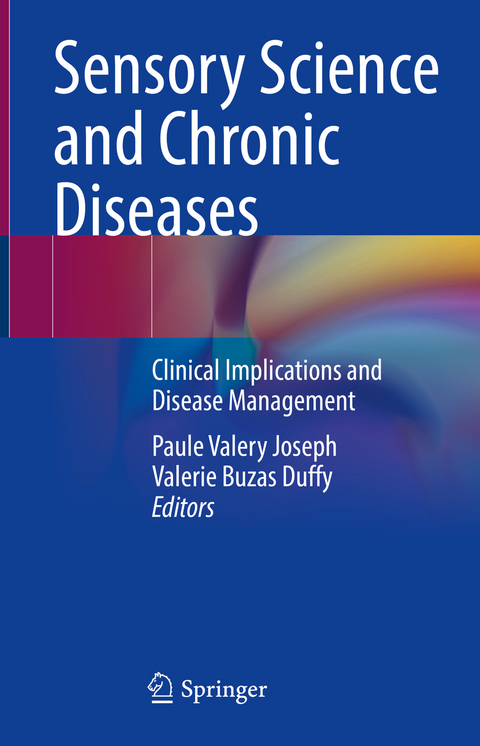
Sensory Science and Chronic Diseases
Springer International Publishing (Verlag)
978-3-030-86281-7 (ISBN)
The textbook provides an overview of the sensory science field in the context of diseases such as obesity and Coronavirus disease 2019 (COVID-19). This book brings a summary of the state of the science in key areas and provides examples of translational science from using cellular and rodent models to human clinical trials and community health. The volume structure leads the reader through the physiology of taste and smell into how sensory testing for taste and smell is studied, basic mechanisms, various protocols that are used throughout the field along with the pros/cons of the current methods used. This resource is intended for classroom teaching, for novice researchers in sensory research as well as students and postdoctoral fellows. Example of courses are nutrition, basic nursing, interdisciplinary health courses, sensory perception (psychology), neuroscience, and medical courses, dentistry, food science and others.
lt;b>Paule Joseph, PhD, RN, MS, CRNP, FAAN is a Lasker Clinical Research Scholar, Tenure Track Clinical Investigator and Chief of the Section of Sensory Science and Metabolism Unit (SenSMet) in the National Institute on Alcohol Abuse and Alcoholism, Division of Intramural Clinical and Biological Research (DICBR) with a joint appointment at National Institute of Nursing Research(NINR) . She is is also a 2018 NIH Distinguished Scholar. Dr. Joseph is conducting preclinical, clinical, and translational studies to improve the diagnosis, prevention, and management of chemosensory disorders. The Section of Sensory Science and Metabolism (SenSMet) aims to understand neurological and molecular mechanisms underlying chemosensation (taste, smell & chemesthesis) and motivational pathways of ingestive behaviors how they might be different in individuals with obesity and alcohol and substance use disorders. Her laboratory is particularly interested in studying how the brain incorporates chemosensory information from the external environment and its internal states to guide eating/ingestive behavior. To achieve this goal, her laboratory conducts clinical-translational inpatient and outpatient studies. We use a combination of biobehavioral and innovative validated psychophysical methods for human studies. Her laboratory also use imaging brain techniques, such as fMRI for olfaction and gustation. To provide mechanistic insight into our clinical research, her laboratory is also conducting preclinical studies using rodent models to understand cellular and molecular mechanisms that influence how the brain perceives the chemical senses (taste, smell, chemesthesis) and feeding behavior in a state of disease (e.g., obesity and substance use disorders). In addition, due to reports of taste and smell loss from individuals affected by COVID-19, our lab began investigating chemosensation and COVID-19. We are focused on understanding the effects of the SARS-CoV-2 virus on the chemical senses. Dr. Joseph's laboratory is leading research that is aimed at enhancing the understanding of molecular, cellular, neural, and behavioral mechanisms underlying symptoms to identify new targets for treatment and improve symptom management strategies for chemosensory disorders. Furthermore, the laboratory is interested in the interplay between metabolic disorders, sensory-related pathways and brain diseases, in particular alcohol and substance use disorders. As a nurse and family nurse practitioner, Dr. Paule Joseph has worked extensively with individuals with diabetes, and obesity including ndividuals undergoing weight loss surgery. She also has expertise in the clinical management of substance use disorders. Dr. Joseph has received several awards, including the highly competitive Johnson & Johnson- American Association of Colleges of Nursing's Minority Nurse Faculty Scholarship and the Rockefeller University Heilbrunn Nurse Scholar Award. She is a fellow of the New York Academy of Medicine, Fellow of the American Academy of Nursing and an international Transcultural Nursing Fellow. Dr. Joseph's leadership comprises her multifaceted career combining research and clinical practice. Aside from her research at the NIH, Dr. Joseph is devoted to promoting diversity and decreasing health disparities. Her visionary leadership of national and global non-profits has focused on increasing the promotion of health within underserved populations and increasing diversity among the next generation of clinical and translational researchers. She currently serves as Vice-president of the Amazing Grace Children's Foundation based in Ghana. She also mentors and trains students and junior faculty from underrepresented backgrounds. Additionally, she serves as the Director of Mentorship for the African Research Academy for Women. Dr. Joseph's clinical experience, research interests, leadership skills, and dedication to diversity and health
Preface.- 1. Taste and Smell Systems Development during infancy, childhood.- 2.Anatomy, Physiology and Neurobiology of Olfaction and Gustation.- 3.Measurement of Olfaction : Screening and assessment.- 4.Measurements of Gustation: Screening and assessment.- 5.Measurements of Chemesthesis.- 6.Integration of taste, smell and chemestesis: Clinical Implications.- 7.Overview of olfaction and gustation under metabolic influences.- 8.Studies on the sense of smell and taste in individuals with obesity.- 9.Studies on the sense of smell and taste in individuals with diabetes.- 10.Studies on the sense of smell and taste in individuals with hypertension.- 11.Studies on the sense of smell and taste in psychiatric disorders.- 12.Taste and Smell alterations and Neurodegenarative Disorders.- 13.Taste and smell in weight loss surgery 3.- 14.Taste and Smell alterations and Cancer Therapies.- 15.Oral health and chemosensory problems.- 16.Chemosensation and pharmacological treatments.- 17.Oral and Extraoral Olfactory and Taste Receptors.- 18.Sensory Nutrition. Implications to Health and Personalized Medicine.- 19.Oral health and Microbiome: Implications for Taste.
| Erscheinungsdatum | 22.12.2021 |
|---|---|
| Zusatzinfo | XII, 257 p. 45 illus., 42 illus. in color. |
| Verlagsort | Cham |
| Sprache | englisch |
| Maße | 155 x 235 mm |
| Gewicht | 629 g |
| Themenwelt | Pflege ► Studiengänge ► Pflegewissenschaft |
| Schlagworte | Anorexia nervosa • Bulimia nervosa • Chemosensory Alterations • Diabetes • disease prevention • Health Promotion • Obesity • Sensory Nutrition • Taste • Taste Genetics |
| ISBN-10 | 3-030-86281-X / 303086281X |
| ISBN-13 | 978-3-030-86281-7 / 9783030862817 |
| Zustand | Neuware |
| Haben Sie eine Frage zum Produkt? |
aus dem Bereich


